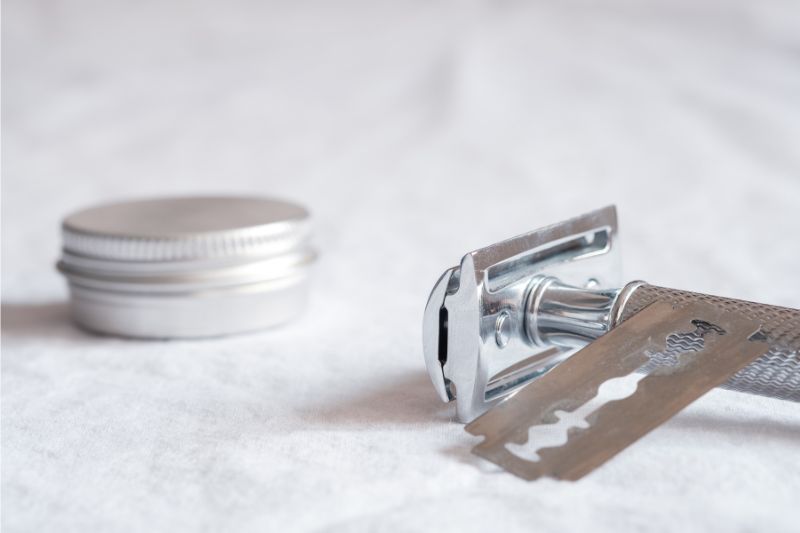No products in the cart.
Why You Should Never Share Your Razor

Ever since our youngest memories, we’re told to share with others. While sharing can be a kind gesture in many cases, there are certain things that are best left unshared like a razor. Orthodontic retainers come to mind. Personal detail can be another unwelcome overshare.
But straight razors? Why not share a straight razor? The answers may surprise you, so check out our top eight reasons to not share your razor.
1. Shorter Life
Your straight razor can easily give you a lifetime’s worth of perfect shaves… a well-cared-for one can even be passed down to the next generation of master straight razor shavers. Add an extra user to that list and, by necessity, your razor will have a shortened lifespan. There are only so many times a razor can be stropped, honed, or sharpened until it’s little more than a nub. Why speed it up?
2. Dull Razor
As mentioned, straight razors need to be stropped. Stropping before or after every use helps keep the edge fine and razor burn or ingrown hairs at bay. Straight razors also need to be lightly honed every few months or so to keep their edges, well, razor sharp. If you’re sharing your razor, you either need to do extra maintenance or you have extra maintenance you aren’t aware you need.
3. Injury
A straight razor comes with a learning curve. Unlike a safety razor or disposable razor, a straight razor is a bare blade with nothing between the edge and the user’s skin. In the hands of a practiced and capable user, it can safely provide the closest, smoothest shave imaginable. In the hands of someone inexperienced, it could be a bloodbath that you don’t want to have anything to do with. You don’t want that on your conscience.
4. Ingrown Hairs
These are caused by hair that’s been removed below the skin. As the hair tries to grow back out, it becomes impacted and curves back into the skin, becoming infected and causing swollen bumps. Unlike many other methods, straight razors excel at preventing ingrown hairs… if the razor is sharp. If you have a razor that’s been dulled from being shared, your likelihood of unsightly, painful ingrown hairs goes up.
5. Barber’s Itch
Officially known as “tinea barbae,” this is a fungal infection that resembles razor burn. It takes the form of bumps that may or may not itch and can form crusty pustules. If you need further incentive, “tinea” is also the technical name for “ringworm” and this condition is also known as “beard ringworm.” If you share a razor with someone who has barber’s itch, you could wind up with it, too.
6. Barber’s Rash
Barber’s rash, or folliculitis, so strongly resembles barber’s itch that they can easily be confused with each other. Instead of a fungal infection, though, barber’s rash is an infection of staph bacteria. It resembles acne, forming itchy, red, pus-filled bumps. These bumps can harden, scar over, and change pigmentation. A used razor is a great way to encourage barber’s rash.
7. Sepsis
Now we’re getting into some seriously dangerous territory. Sepsis may not be the most likely hazard, but it’s not one worth risking. Any unattended scrape can become a life-threatening situation; a razor dulled from being shared is a good way to get a nasty cut. This can become a medical emergency faster than you think. If you see pus, red skin, worsening swelling, blisters, or it doesn’t heal, get help.
8. STIs
Dull razor or not, having can cause tears in your skin that are too tiny to see. Sexually transmitted infections (STIs) aren’t so easily fooled, though. Any one of these viruses can be spread by trace amounts of blood on your razor coming into contact with open skin. As long as they come into contact with your blood, these viruses don’t care if they’re sexually transmitted or not. If you’re sharing your razor, you’re sharing the risk.
- Herpes
There’s no cure and it isn’t openly dangerous, but herpes can be very embarrassing… especially if the sores form around your mouth.
- Hepatitis C
This virus is more likely to become chronic than a short-term condition. It can cause liver damage, cirrhosis, cancer, and death.
- Syphilis
In addition to horrifying ulcers, syphilis can damage the heart and brain, and cause nerve problems and blindness. Syphilis can be fatal, but is curable at all stages; the damage done in later stages cannot be undone, however.
- HIV
Human Immunodeficiency Virus needs no introduction. Previously 100% fatal, it’s now considered a chronic condition when managed with medication.
Why Risk It?
Even if a shortened life for your razor isn’t a concern, you could be shortening your own life… or someone else’s. There’s just no good reason to risk sharing a straight razor. If someone you know wants a straight razor that badly, buy them one!















Leave a Reply